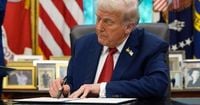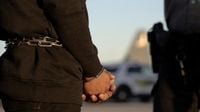In a week marked by a flurry of executive actions and heated rhetoric, President Donald Trump and his administration have unleashed a series of sweeping crackdowns—spanning immigration, domestic security, and political dissent—that are reverberating across the United States and beyond. From new restrictions on the H-1B visa program to a controversial executive order targeting what the White House calls "left-wing terrorism," the Trump administration is pursuing an agenda that critics say is both unprecedented and deeply polarizing.
On September 23, 2025, President Trump signed a proclamation introducing a dramatic overhaul of the H-1B visa system, a program long used by American companies to hire highly skilled foreign workers. According to IANS, the new measures include a staggering $100,000 fee for each new H-1B application—a move that immigration experts and business leaders alike have called "shockingly anti-business." The Department of Homeland Security (DHS) followed up with a proposal to scrap the traditional lottery system in favor of a "weighted selection process" designed to favor higher-skilled applicants.
Sarah Pierce, Director of Social Policy at the think tank Third Way, minced no words in her criticism. "Everything that the Trump administration is doing is causing foreign talent to leave the United States, because they have established attacks on international students," Pierce told IANS. She argued that the administration's policies are making the country "unattractive to both international students and international workers." Pierce also warned that U.S. universities, which rely heavily on revenue from international students, could suffer as a result—potentially hurting American students who benefit from scholarships funded by these revenues.
The Trump administration, for its part, insists that these changes are necessary to protect American jobs and prevent abuses of the visa system. White House spokeswoman Taylor Rogers told IANS, "President Trump promised to put American workers first, and this common-sense action does just that by discouraging companies from spamming the system and driving down wages." The administration's stance is clear: by raising the bar for entry and imposing hefty fees, they hope to ensure that only the most qualified—and most needed—foreign workers are admitted.
But critics like Pierce see the new $100,000 fee as both punitive and legally dubious. "The $100,000 fee is just shocking on its face. I am very sure that it will be challenged in court. I think it will be difficult to establish the grounds. These are absurdly high challenges for a program that’s very important to many U.S. employers," she said. She also pointed to the recent deportation of South Korean workers from a Hyundai factory in Georgia as a sign of the administration's conflicting priorities, noting that the crackdown on skilled immigrants could undermine efforts to bring manufacturing back to the U.S.
While the business community has often led the charge against restrictive immigration policies, Pierce noted an unusual silence from major corporations. "One of the most frightening things about this current administration is how scared they have made corporations and businesses in the United States. We are in a very scary moment in American politics, and it is because of that moment that we’re not seeing a lot of push back from businesses on these H-1B visa changes," she observed.
Immigration wasn’t the only arena where the administration flexed its muscle this week. At the United Nations General Assembly on September 24, President Trump used his address to rail against what he called "uncontrolled migration" to Europe, warning that "your countries are being destroyed" by a "force of illegal aliens like nobody has ever seen before." According to statements reported by multiple outlets, Trump declared, "Every sovereign nation must have the right to control its own borders. You have the right to control your borders, as we do now, and to limit the sheer numbers of migrants entering your countries, paid for by the people of that nation who built that country with their blood, sweat, tears, and money."
Back in Washington, Deputy Secretary of State Christopher Landau convened a U.S.-hosted conference urging other countries to join the crackdown on asylum claims, which he described as riddled with fraud. "If you have hundreds of thousands of fake asylum seekers, then what happens to the real asylum seekers?" Landau asked. He insisted, "Saying the process is susceptible to abuse is not xenophobic; it is not being a mean or bad person." Trump, meanwhile, boasted that for the past four months, "the number of illegal aliens admitted and entering our country has been zero." His message to would-be undocumented migrants was blunt: "If you come illegally into the United States, you’re going to jail, or you’re going back to where you came from, or perhaps even further than that."
But perhaps the most controversial move came on September 25, when Trump signed an executive order directing a sweeping crackdown on what the administration described as "left-wing domestic terrorism." The order, as reported by several outlets, places the FBI’s Joint Terrorism Taskforce at the helm of an effort to "identify and disrupt financial networks that fund domestic terrorism and political violence." The directive also calls on the Treasury Department and the IRS to withdraw tax-exempt status from any organization found to be funding political violence.
In a move that immediately raised eyebrows, Trump named two prominent Democratic donors—billionaires George Soros and Reid Hoffman—as possible funders of violent protests, though he offered no evidence. "If they are funding these things, they’re going to have some problems," Trump said. The president’s allegations, echoed by Vice President JD Vance and other officials, have been rejected by the organizations involved. In a statement, Soros’s Open Society Foundation said, "These accusations are politically motivated attacks on civil society, meant to silence speech the administration disagrees with and undermine the First Amendment right to free speech."
The order follows a string of violent incidents, including the assassination of conservative activist Charlie Kirk and a deadly shooting at an Immigration and Customs Enforcement building in Dallas earlier this month. While authorities have identified suspects in both cases, no evidence has emerged to suggest a broader conspiracy. Still, Trump and his allies have insisted that a shadowy network of "professional agitators and anarchists" is at work, and that wealthy donors are pulling the strings. "Soros is a name certainly that I keep hearing. I don’t know," Trump said. "I hear names of some pretty rich people that are radical left people. ... Maybe I hear about a guy named Reid Hoffman, pretty rich guy I guess."
Stephen Miller, the president’s deputy chief of staff, hailed the order as "the first time in American history that there is an all-of-government effort to dismantle left-wing terrorism." Yet the administration’s focus on left-leaning groups and donors—while largely ignoring violence against Democrats and other political actors—has fueled accusations of partisanship and overreach. Legal experts have also questioned what authority the administration has to make such terrorism designations, given that the State Department’s list of foreign terror organizations has no domestic equivalent, in part because of First Amendment protections.
As the Trump administration presses forward with its crackdown—on immigrants, political dissent, and perceived enemies alike—the country finds itself at a crossroads. Supporters say these moves are necessary to restore order and protect American interests. Critics warn they risk undermining the nation’s values, institutions, and global standing. With legal challenges looming and the political temperature rising, the full impact of these actions may not be clear for some time. But one thing is certain: the debate over who belongs, who decides, and who holds power in America is far from settled.


